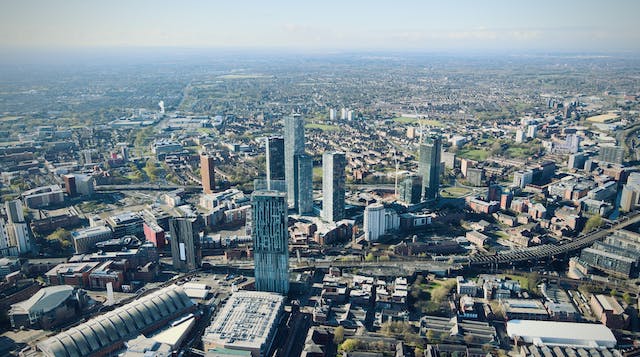In the vibrant heart of Manchester, a name resonates through the bustling streets, lively pubs, and the echoing halls of Manchester Piccadilly station. That name belongs to the most iconic football club, known affectionately as the Red Devils — Manchester United.
With a history as exhilarating as the football they play, Manchester United’s story is woven into Manchester’s fabric, embodying the city’s resilient spirit and unwavering passion for the beautiful game. Drop your gear off at a Manchester Piccadilly luggage storage service spot and head into the history and excitement of this iconic team.
How Was Manchester United Founded?
The story starts in 1878, when the Newton Heath LYR Football Club was formed, a modest group of railway workers bound by their mutual love for football. Few at the time could predict the legendary status this humble club would achieve.
Over the years, the club underwent several transformations, culminating in 1902 when they emerged as the Manchester United we know today. Its ties to the city’s mundane routines and railway roots form an integral part of United’s unique history, a testament to Manchester’s deeply ingrained football culture.
Manchester United’s trophy cabinet groans under the weight of domestic and international titles — 20 English league titles, 12 FA Cups, 5 League Cups, and an impressive 3 UEFA Champions League trophies, among others. These achievements speak profoundly of the club’s monumental efforts and captivating journey.
Who Were Manchester United’s Biggest Names?
Post-war saw the emergence of giants like Sir Matt Busby, who led the team to its first European Cup success in 1968, and players like George Best, Bobby Charlton, and Denis Law, the United Trinity. The infamous Munich air tragedy in 1958 dealt a blow to the club’s spirit, but it rose like a phoenix from the ashes, a testament to resilience that deepened supporters’ affection.
Emerging from this dark period, United ushered in an era of unprecedented success under the legendary manager Sir Alex Ferguson. Icons like Eric Cantona, Ryan Giggs, Paul Scholes, and later Cristiano Ronaldo wrote their own chapters of glory.
From Cantona’s audacious chip against Sunderland to Ronaldo’s thunderbolt against Porto, these moments of brilliance still excite every Red Devils supporter. Each trophy lift, every nail-biting victory, and even the gut-wrenching defeats form indelible footprints on football’s landscape, etching Manchester United’s name in golden letters in the annals of football history.
The club’s story is far from over, and as the Red Devils march on, one can only eagerly anticipate what more is to come. For now, we can only marvel at the past, revel in the present, and await the future with bated breath. Here’s to Manchester United, the Red Devils of Manchester, and the beating football heart of a city.
How Can the Club Influenced Manchester’s Culture and Identity?
Over time, Manchester United’s influence has spilled out from the confines of Old Trafford, permeating moonlit alleyways, bustling cafés, and lively pub conversations while sculpting Manchester’s cultural identity. United’s victories and losses have dictated the city’s mood, illustrating the intrinsic symbiosis between Manchester and its Red Devils.
Manchester culture has been colored with the hues of football chants, iconic goals narrated and re-narrated, and tales of glorious comebacks. United successes are celebrated city-wide, as joyous nights spill out into the streets, while heartaches hang heavy over the city like Manchester’s infamous gray rain.
United is a shared heritage, a collective memory, and an emblem of the city. Its international players, including George Best from Northern Ireland, Eric Cantona from France, and Cristiano Ronaldo from Portugal, have brought globalization to Manchester. They became part of Manchester’s identity, embodying the local spirit while adding an international flair.
The Red Devils Today
Today, Manchester United continues to command attention globally as a top-tier team in the English Premier League, attracting viewership and fandom that transcends geographical borders. Old Trafford, their home ground, is a monument to the team’s legacy — part sporting epicenter, part cultural mecca.
And yet, despite being a global powerhouse, United remains intrinsically Manchester. Each home game sees the area around the stadium alight with a spirited mixture of locals and tourists, echoing the early customs of United’s faithful followers.
It’s a story not confined solely to football or the team’s achievements but a narrative deeply woven into the socio-cultural fabric of Manchester. Amid the hustle and bustle of city life, Manchester unfailingly whispers stories of the Red Devils’ triumphs, trials, and indomitable spirit.
United We Stand: Embracing the Legacy of Manchester United
So whether you’re a die-hard football enthusiast, a casual sports fan, or simply a traveler exploring Manchester’s rich historical tapestry, United’s tale of resilience, achievement, and unyielding passion surely resonates. Take a moment to imagine the cheers, the chants, and the triumphant roars of victories past.
Experiencing United is about embracing the heart of Manchester, understanding its spirit, celebrating its triumphs, and standing steadfast in its trials. As the echoes of “Glory Glory Man United” reverberate through the city streets, we are all part of the Red Devils’ enduring story.
The New Jersey Digest is a new jersey magazine that has chronicled daily life in the Garden State for over 10 years.
- Staffhttps://thedigestonline.com/author/thedigeststaff/
- Staffhttps://thedigestonline.com/author/thedigeststaff/
- Staffhttps://thedigestonline.com/author/thedigeststaff/
- Staffhttps://thedigestonline.com/author/thedigeststaff/


